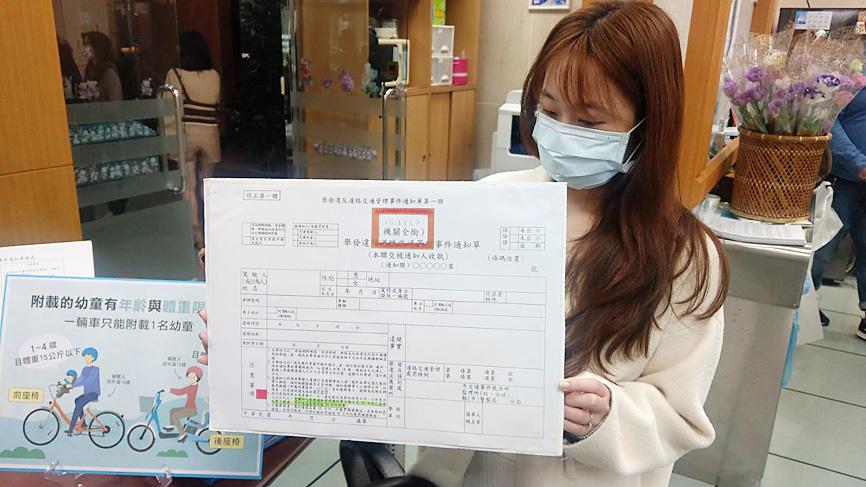Parents are encouraged to buy bicycles certified as safe by the government if they are to carry children on them, the Ministry of Transportation and Communications said yesterday, one year after an amendment to Article 76 of the Road Traffic and Management and Penalty Act (道路交通管理處罰條例) was implemented.
The amendment requires cyclists, who must be 18 years of age or older, to carry no more than one child while cycling, adding that they must ride bicycles or electric power-auxiliary bicycles that are certified by the government to be safe.
The rules also state that a child’s seat installed at the front of a bicycle should be used for children aged one to four and weighing less than 15kg, while a seat at the rear should be used for children aged one to six and weighing less than 22kg.

Photo: Cheng Wei-chi, Taipei Times
Cyclists contravening the rules would face a fine of NT$300 to NT$600, the act says.
Bicycles to carry children should have passed the TBIS007 safety inspection, the ministry said.
The Vehicle Safety Certification Center is designated by the ministry to issue certification labels for bicycles that pass the inspection, it said, adding that the labels should be visible on bikes as well as child seats.
Child safety seats to be installed on bicycles should also pass Taiwan’s CNS15978 national safety standard, the ministry said.
Two types of bicycles, two types of electric power-auxiliary bicycles and six types of child seats have passed national safety inspections after the amendment to the act was implemented on March 1 last year, Department of Railways and Highways Director-General Chen Wen-ruey (陳文瑞) said.
That means there are 24 combinations of bike and seat, he said, adding that the information on certified bicycles and seats can be viewed on the center’s Web site at www.vscc.org.tw.
So far, the center has issued only 1,500 certification labels, which means that the ministry should spend more time promoting the use of safe bicycles among parents with children, Chen said.
All of the certified bicycles are made by Taiwanese manufacturer Giant, with prices ranging from NT$7,000 to NT$40,000.
Certified seats are made by Bobike and Irbani, with costs varying from NT$3,000 to NT$8,000.

Costa Rica sent a group of intelligence officials to Taiwan for a short-term training program, the first time the Central American country has done so since the countries ended official diplomatic relations in 2007, a Costa Rican media outlet reported last week. Five officials from the Costa Rican Directorate of Intelligence and Security last month spent 23 days in Taipei undergoing a series of training sessions focused on national security, La Nacion reported on Friday, quoting unnamed sources. The Costa Rican government has not confirmed the report. The Chinese embassy in Costa Rica protested the news, saying in a statement issued the same

Taiwan’s Liu Ming-i, right, who also goes by the name Ray Liu, poses with a Chinese Taipei flag after winning the gold medal in the men’s physique 170cm competition at the International Fitness and Bodybuilding Federation Asian Championship in Ajman, United Arab Emirates, yesterday.

A year-long renovation of Taipei’s Bangka Park (艋舺公園) began yesterday, as city workers fenced off the site and cleared out belongings left by homeless residents who had been living there. Despite protests from displaced residents, a city official defended the government’s relocation efforts, saying transitional housing has been offered. The renovation of the park in Taipei’s Wanhua District (萬華), near Longshan Temple (龍山寺), began at 9am yesterday, as about 20 homeless people packed their belongings and left after being asked to move by city personnel. Among them was a 90-year-old woman surnamed Wang (王), who last week said that she had no plans

TO BE APPEALED: The environment ministry said coal reduction goals had to be reached within two months, which was against the principle of legitimate expectation The Taipei High Administrative Court on Thursday ruled in favor of the Taichung Environmental Protection Bureau in its administrative litigation against the Ministry of Environment for the rescission of a NT$18 million fine (US$609,570) imposed by the bureau on the Taichung Power Plant in 2019 for alleged excess coal power generation. The bureau in November 2019 revised what it said was a “slip of the pen” in the text of the operating permit granted to the plant — which is run by Taiwan Power Co (Taipower) — in October 2017. The permit originally read: “reduce coal use by 40 percent from Jan.